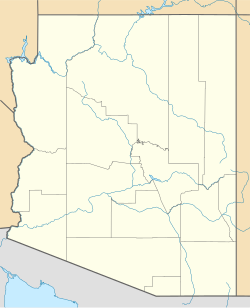Pima Air & Space Museum
 The main entrance to the museum | |
| Established | May 8, 1976 |
|---|---|
| Location | 6000 East Valencia Road Tucson, Arizona, United States |
| Coordinates | 32°08′20.2″N 110°52′07.3″W / 32.138944°N 110.868694°W |
| Type | Aviation museum |
| Director | Scott Marchand |
| Website | pimaair |
The Pima Air & Space Museum is an aerospace museum in Tucson, Arizona, US. It features a display of nearly 400 aircraft spread out over 80 acres (32 ha) on a campus occupying 127 acres (51 ha). It has also been the home to the Arizona Aviation Hall of Fame since 1991.
Overview
[edit]A large number of the museum's aircraft are displayed outside with the remainder located in one of the museum's six display hangars.[1] In addition to the display hangars, the museum has a restoration hangar.[2]
Opened to the public in May 1976 with 48 aircraft then on display, the museum's main hangar houses an SR-71A Blackbird, an A-10 Warthog, a United States Air Force Through the Years exhibit, and a mock-up of a control tower.
The museum is adjacent to Davis-Monthan Air Force Base. The 309th Aerospace Maintenance and Regeneration Group (AMARG), affiliated with the base, also known as the "Graveyard of Planes" or "The Boneyard", is the largest aircraft storage and preservation facility in the world.[3]
History
[edit]The museum opened to the public on May 8, 1976. In early 1982 the first hangar on the site was completed. A second was built in 1987, a third in 1992, and a fourth in 1994.[1] After running into difficulty in the late 1990s, the museum recovered and continued expanding.[4]
In 2012, the museum collaborated with artists, in The Boneyard Project, to place some abandoned aircraft on display as canvases for art.[5][6]
During 2015, Boeing donated to the museum a flight test 787 aircraft which is the second built. It is exhibited in the colors of the 787 customer, ANA.[7]
In November 2016, Orbis International donated their first McDonnell-Douglas DC-10 Flying Eye Hospital to the museum, after receiving a second DC-10 from FedEx. The DC-10, which was the oldest flying example of its type and at the time of its donation, while being the oldest surviving example and the second overall built, was restored for display at Davis–Monthan Air Force Base.[8]
The museum acquired 77 acres (31 ha) in January 2021 for the construction of the Tucson Military Vehicle Museum. The new museum will house a large number of mostly land vehicles, including 50 donated by the Imperial War Museum.[9]
Selected aircraft on display
[edit]Out of a collection of 400 aircraft, these are the most prominent:[1]
|
† B-17G serial number 44-85828 is on display at the 390th Memorial Museum,[16] co-located on the grounds of the Pima Air & Space Museum.[17]
In addition to other ephemera, the museum contains the Shuttle Mission Simulator's GNS (Guidance and Navigation Simulator) trainer, and a full-size mockup of the Solid Rocket Booster.[18][19]
-
SR-71 Blackbird
-
Boeing B-17G 44-85828, wearing the livery of 42-31892 "I'll Be Around"
-
Boeing B-29 Superfortress 44-70016
See also
[edit]References
[edit]- ^ a b c Stemm, James. "History of the Pima Air & Space Museum". Pima Air & Space Museum. Pimaair.org. Retrieved May 12, 2017.
- ^ "Restoration Hangar & Project Status". Pima Air & Space Museum. Archived from the original on February 8, 2014. Retrieved May 14, 2017.
- ^ ""Boneyard"/AMARG Tour". Pima Air & Space Museum. Pimaair.org. Retrieved May 15, 2017.
- ^ Spigelman, Monica Surfaro (February 12, 2014). "Delight in Flight Count Raises $12 Million for Aviation Museums". BizTucson. Retrieved February 5, 2024.
- ^ Firestone, Eric (2012). "[Homepage]". The Boneyard Project: Return Trip. Retrieved May 15, 2017.
- ^ Francis, Christopher (2013). "Plane becomes canvas at Pima Air & Space Museum". Tucson News Now. Raycom Media. Retrieved May 15, 2017.
- ^ "Boeing donates 787-8 ZA002 (N787EX) to the Pima Air and Space Museum". World Airline News. April 20, 2015. Retrieved August 26, 2015.
- ^ Wilson, William. "Pima Space Museum to get DC-10 that served as flying eye hospital". Arizona Daily Star. Retrieved November 20, 2018.
- ^ "Expansion of the Pima Air and Space Museum with the Tucson Military Vehicle Museum" (PDF). Pima County. January 26, 2021. Retrieved February 4, 2021.
- ^ "First Boeing 777 now at Pima Air and Space Museum". News for Tucson. September 18, 2018. Retrieved February 4, 2021.
- ^ "Boeing B-17G (PB-1G) Flying Fortress". pimaair.org. Retrieved November 20, 2022.
- ^ "Hangar 4". Pima Air & Space Museum. Archived from the original on February 8, 2014. Retrieved May 15, 2017.
- ^ "Hangar 3". Pima Air & Space Museum. Archived from the original on February 8, 2014. Retrieved May 15, 2017.
- ^ "Airframe Dossier 52-2827 USAF B-36J". Aerial Visuals - Airframe Dossier. June 2, 2021. Retrieved June 2, 2021.
- ^ a b c d "Hangar 1 South The Spirit of Freedom Hangar". Pima Air & Space Museum. Archived from the original on February 8, 2014. Retrieved May 15, 2017.
- ^ "B-17: The Flying Fortress". 390th.org. Retrieved November 20, 2022.
- ^ "Plan Your Visit". 390th.org. Retrieved November 20, 2022.
- ^ Jess, Steve (February 7, 2022). "Former shuttle cockpit simulator comes to Tucson". news.azpm.org. Retrieved December 1, 2022.
- ^ "THIOKOL SPACE SHUTTLE SOLID ROCKET BOOSTER - Pima Air & Space". Pima Air & Space. Retrieved December 1, 2022.
External links
[edit]- Official website

- The Boneyard Project, Eric Firestone Gallery, Tucson. Includes narrated video/slide show.



